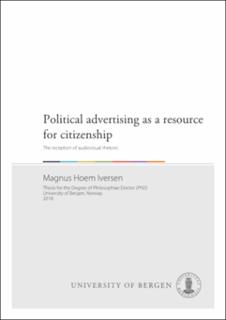| dc.description.abstract | This thesis explores the reception of audiovisual rhetoric in the form of political advertising. I argue that political ads can function as a resource for citizens. The ads allow people to enact a receptive rhetorical citizenship. They do so by providing substance for everyday practical judgement on issues and political leaders, and through sparking more general discussions on political matters. The thesis contributes empirically by examining receptive dimensions of rhetorical citizenship, which scholars have called for at numerous occasions but not yet fully explored. The thesis contributes theoretically through proposing a way researchers can go about this, including the formulation of four virtues of receptive rhetorical citizenship: inclusiveness, openness, connection and literacy. The thesis combines the traditions of rhetoric and audience studies in a manner that has only rarely been put into play before. The empirical data material revolves around political ads produced for two separate elections in 2013 and 2015. Directing the main thrust of analysis towards reception, the data material consists of 16 focus groups conducted with a range of voters. Taking a holistic approach to the study of audiences, the study also draws on supplementary interviews with 23 ad producers, strategists and politicians, as well as a rhetorical textual analysis of the eight films that were discussed in the groups. Thematically, the eight films produced talk and discussion around three key themes: 1) the balance between informative aspects and entertaining aspects in political ads; 2) negativity in political ads; and 3) personalization in political ads. Lastly, 4), I examine informants’ discussions from the vantage point of reception research in order to further tease out nuances of how citizens use ideals such as authenticity and aptum as evaluative concepts, as well as discuss informant reflexivity and various modes of reception they engaged in. I find that citizens are deeply ambivalent to political ads as a genre, in particular towards the trade-off between informing and entertaining in a communicative text. I find that informants for the most part accepted negativity in political ads, while at the same time attempted to discern between useful and non-useful negativity. Furthermore, I provide nuance and detail to how people use personality as a route to judgement on candidates and other political matters when watching advertisements. Importantly, elements of personalization - ordinariness, authenticity and sociability - are highly at work. Lastly, I provide further detail on what kind of receptive rhetorical citizenship people enact in the interview situation. I propose the concept of breaching moments through authenticity and aptum as a novel way to understand the nuts and bolts of how form and content interacts when people are to evaluate their political leaders on screen. | en_US |
